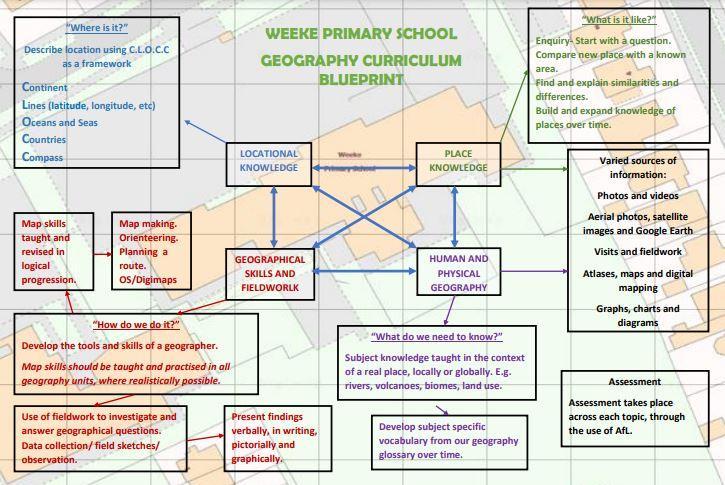Geography
Geography Intent
At Weeke Primary School, our goal is that children develop a keen sense of awe and wonder about the world around them, its landscapes and its people that will last them their whole lives. Children will develop secure locational and place knowledge, gain an understanding of specific areas of human and physical geography and practise skills of geographical and fieldwork in order to develop a framework and vocabulary for understanding the world. They will explore the similarities and differences between contrasting places, building up an understanding of how people interact with landscapes in different ways.
We want children to share their curiosity about the world and, through enquiry-based learning, be critical thinkers when exploring a wide range of sources of information to answer questions about places near and far. We want them to grow to understand the inter-connectedness of physical landscapes, resources, trade and people so that they can grow into responsible and informed citizens who can make a positive impact locally and globally. Through the carefully planned, inclusive and engaging curriculum, children will develop a fascination for geography, exploring what the world is like, and why it is like it.
Geography Implementation
In each unit of work, children will develop their geographical knowledge and skills in the four main areas of the geography programme of study from the national curriculum. Children will
- develop their locational knowledge by using maps and atlases to build up an understanding of where places are in the world and in relation to each other.
- develop their place knowledge by examining what places are like and comparing them to other places. This often involve enquiry-based learning, using different sources of information to answer a key question about a place.
- develop their map and fieldwork skills by experiencing and using a range of maps and atlases when studying places, and having relevant fieldwork experiences.
- learn about key areas of human and physical geography, as set out in the programmes of study, relevant to the place being studied.
There is no set order for these four areas of geographical learning to be taught in each unit. They are inter-connected and are covered in the most effective order at the discretion of the teacher planning the unit of work. For example, while many units might start with locational learning before focusing in on specific places or geographical features, in some units it might be more useful to start by teaching a specific piece of geographical knowledge (e.g. rivers), before embarking on a study or enquiry about a specific place. Some units if work will link to a literacy unit, although this will only be where the links deepen the learning in each subject.
Some units of work will open with a question to be investigated. Enquiry-based learning allows children to use analytical skills to review and analyse sources of information purposefully, incorporating new learning and building on prior learning to break down a question that seems too large to start with. It allows children to present their findings and ideas in a variety of ways.
The geography blueprint illustrates the joined-up approach we use in teaching the different areas of geography.
Geography Blueprint

Geography in Early Years at Weeke
Geography Coverage and Progession
Geography Impact
The geography curriculum at Weeke Primary School will ensure that all children will have developed an understanding of the world, its environments, places near and far and the processes that create and affect them by the time they leave Year 6. Furthermore, it will also ensure that pupils are equipped with geographical skills and knowledge to enable them to thrive in Key Stage Three and beyond. As well as learning the key knowledge and skills as set down in the National Curriculum programme of study, children will leave Weeke having developed the ability to think critically, ask relevant questions, collect and analyse data and present the findings in different ways. They will be confident in using a range of sources of information and will have developed the vocabulary to discuss and explain their thoughts about geography effectively.
Our clear progression of knowledge and skills in geography means that teachers will be confident in knowing how the units they plan and teach fit within the jigsaw of geographical learning at Weeke. Teachers know what has been taught previously and what is new learning, which enables them to plan and teach effective and memorable units that help the children to understand and remember key geographical concepts and vocabulary.
Teachers use assessment for learning to monitor children’s progress against the progression of skills and the ‘ARE geography document’ as well as by using informal assessments such as quizzes and map challenges.
Children leave Weeke Primary School as enthusiastic and confident geographers.
What next for our pupils?
A proportion of our children in Year 6 go on to our local secondary school - Henry Beaufort. We work closely with our secondary schools to support the best possible transition not only for the whole children but to ensure their successful curriculum journey continues. This includes curriculum opportunties where we visit the school or we have specialist teachers come to teach our children key knowledge, skills and understanding.
To gain a further understanding of the next step in our children's learning journey please visit Henry Beauforts curriculum pages. Here you will see how the Primary curriculum at Weeke enables the children to continue to make progress in given subjects.